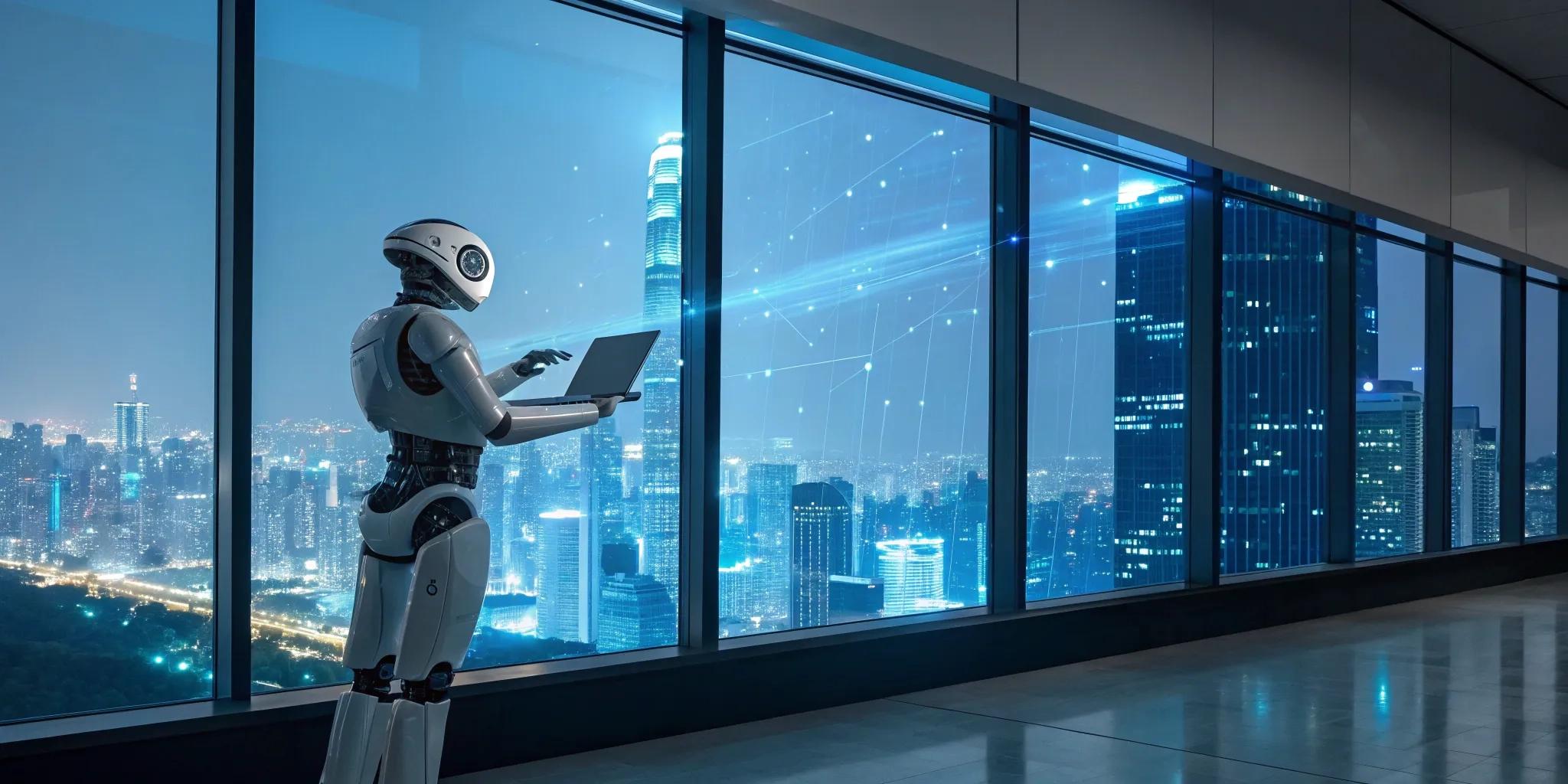Hiring for a specialized role like an AI Engineer can feel like a high-stakes gamble. A wrong choice sets projects back months and can be a costly cultural mismatch, but the traditional hiring process offers few guarantees. That’s why the "try before you buy" model is so appealing—it gives you a chance to see a candidate’s skills in action before making a long-term commitment. Now, this proven model is getting a major upgrade. By blending intelligent technology with a flexible approach, ai contract-to-hire services offer a smarter, more confident way to build your team. This guide explains how they work and why they reduce risk.
Key Takeaways
- Test Skills and Fit Before Committing: Use the contract-to-hire model to evaluate a candidate's real-world performance and team dynamics. AI accelerates this process by quickly identifying top contenders, letting you assess the best talent without the immediate risk of a permanent hire.
- Use Data to Hire with Confidence: AI platforms provide predictive insights into a candidate's potential for success and help reduce unconscious bias by focusing on skills over demographics. This data-driven approach helps you make more objective, informed decisions and build stronger, more diverse teams.
- Empower Your Team with AI Tools: Treat AI as a powerful assistant that handles repetitive tasks like resume screening and scheduling. This frees up your recruiters to focus on what matters most—building relationships, conducting meaningful interviews, and making the final, human-centered hiring decisions.
What Are AI Contract-to-Hire Services?
Think of contract-to-hire as a "try before you buy" approach to building your team. It’s a flexible arrangement where a company brings on a professional for a set contract period. At the end of the term, if it’s a great fit for everyone, the company can extend a full-time employment offer. Now, let's add Artificial Intelligence to the mix. AI contract-to-hire services use smart technology to make this entire process more efficient and successful. Instead of relying solely on manual screening, AI-powered platforms can analyze candidate profiles and job requirements to find the best possible matches from the start.
This modern approach is especially useful in specialized fields like Machine Learning, where the right technical skills and cultural fit are critical. It gives companies a low-risk way to assess a candidate’s real-world performance and team dynamics. At the same time, it allows professionals to experience a company’s work environment before making a long-term commitment. By blending a flexible hiring model with intelligent technology, AI contract-to-hire provides a powerful solution for today’s competitive talent market.
How the Hiring Model is Evolving
The demand for top AI talent has created a global race, making it incredibly challenging for companies—especially smaller ones—to compete with large corporations for skilled professionals. In this environment, traditional hiring methods can be slow and may not always yield the best candidates. This is where the hiring model is adapting. Specialized AI staffing agencies are becoming essential partners for businesses, helping them find pre-vetted candidates with the niche skills required for AI and Data Science roles. The contract-to-hire model has emerged as a strategic response, offering the flexibility needed to secure top talent without the immediate commitment of a permanent hire. It’s a practical way to build your team with confidence.
The Role of AI in Modern Hiring
So, how does AI actually improve the hiring process? At its core, AI uses smart algorithms to quickly and accurately match a job’s requirements with a candidate’s skills and experience. This technology can analyze vast amounts of data to identify the most promising individuals, speeding up the search and helping you find people who are a better fit for the long term. This is a huge advantage for small and medium-sized businesses, as it saves valuable time and resources, allowing them to find great employees more effectively. When used in a contract-to-hire setting, AI helps ensure the candidates you bring in for a trial period are already highly qualified, making the evaluation process more meaningful and increasing the chances of a successful permanent hire.
What to Expect from an AI Contract-to-Hire Platform
When you partner with an AI-powered contract-to-hire service, you’re stepping into a more strategic and efficient way of building your team. Instead of sifting through endless resumes and relying on gut feelings, you can expect a process driven by data and precision. These platforms use sophisticated algorithms to handle the heavy lifting, from initial screening to predicting a candidate's long-term success. This frees up your hiring managers to focus on what they do best: connecting with top-tier talent and making final, informed decisions.
The goal is to give you a clearer picture of the talent landscape and a faster path to finding the right fit. You can anticipate a streamlined workflow where the best candidates are surfaced quickly, complete with insights that go far beyond a traditional resume. This approach not only accelerates the hiring timeline but also introduces a level of accuracy that helps ensure the person you bring on for a contract period is someone you’ll want to hire permanently. It’s about making smarter, data-backed choices that align with your company’s long-term goals for roles in AI engineering and beyond.
Smart Candidate Matching
Forget basic keyword searches. AI-driven platforms use intelligent algorithms to match job requirements with candidate skills on a much deeper level. These systems analyze resumes, project histories, and skill sets to identify individuals who are not just qualified on paper but are also a strong fit for the role and your company culture. This technology understands the nuances of complex roles, like those in machine learning, ensuring the candidates presented to you have the specific expertise you need. The result is a higher-quality shortlist delivered in a fraction of the time, helping you find people who are more likely to succeed and stay for the long haul.
Automated Screening and Assessments
One of the most time-consuming parts of hiring is the initial screening process. AI platforms automate these repetitive tasks, such as reviewing resumes and conducting preliminary assessments. By handling the initial vetting, the system allows your hiring team to skip straight to engaging with a curated pool of qualified candidates. This automation doesn’t just save time; it also standardizes the initial evaluation process, ensuring every applicant is assessed against the same criteria. This lets your team focus their energy on the more human elements of recruitment, like conducting meaningful interviews and determining cultural fit for your hiring solutions.
Using Data to Make Better Hiring Choices
AI brings predictive power to your hiring process. By analyzing data from past hires and performance metrics, these platforms can help forecast a candidate's potential for success within your organization. This data-driven approach moves beyond intuition, offering concrete insights that can prevent costly hiring mistakes and improve the overall quality of your team. When you’re filling critical roles in fields like data science and analytics, having this predictive capability is invaluable. It helps you identify candidates who not only have the right skills but also demonstrate the traits that lead to long-term success and retention.
Connecting with Your Current Systems
A modern AI contract-to-hire platform should work with your existing tools, not against them. Smooth integration with your current Applicant Tracking System (ATS) and other HR software is essential for a seamless workflow. This ensures that data flows correctly between systems, preventing information silos and administrative headaches. The transition to an AI-powered solution is both a technological and a human one, and having it align with your established processes makes adoption much easier for your team. This connectivity ensures that you can add powerful new capabilities without disrupting the systems your organization already relies on.
The Advantages of AI in Contract-to-Hire
Bringing AI into your contract-to-hire strategy isn't just about keeping up with technology—it's about making smarter, faster, and more confident hiring decisions. This approach gives you a chance to see how a new team member fits before making a long-term commitment, and AI streamlines the entire process. From identifying the right skills to ensuring a great candidate experience, using AI offers some significant benefits that can reshape how you build your team.
Hire Top Talent, Faster
In the fast-moving world of AI and machine learning, speed is everything. Waiting weeks to fill a critical role can put projects behind schedule. AI-powered recruitment platforms use intelligent algorithms to quickly scan through countless profiles and pinpoint candidates whose skills and experience perfectly match your job requirements. This automation cuts down the manual work of sifting through resumes, allowing you to connect with qualified professionals much faster. Instead of getting bogged down in the initial search, you can focus your energy on interviewing the best of the best, shortening your hiring timeline from months to weeks.
Access Higher-Quality Candidates
Finding candidates with niche skills in fields like data science and analytics can feel like searching for a needle in a haystack. AI contract-to-hire services give you access to a curated pool of pre-vetted professionals who are ready to make an impact. These platforms and the agencies behind them understand the specific technical expertise required for complex AI roles. By leveraging AI, they can identify individuals with the right combination of programming languages, machine learning frameworks, and industry experience. This means you spend less time screening unqualified applicants and more time engaging with high-caliber talent who can truly drive your projects forward.
Increase Cost-Effectiveness
A lengthy hiring process is an expensive one. Every day a position remains open, it can cost your company in lost productivity and team resources. AI helps make your hiring process more cost-effective by automating the most time-consuming tasks. By quickly filtering out candidates who aren't a good fit, AI reduces the hours your team spends on initial screening and interviews. This efficiency not only lowers direct recruitment costs but also minimizes the indirect costs associated with a vacant role. You can find and onboard top talent without breaking your budget, making smarter hiring solutions accessible for teams of all sizes.
Reduce Hiring Risks
Making the wrong hire is a costly mistake, both financially and culturally. The contract-to-hire model is already a great way to mitigate this risk, and AI adds another layer of confidence. Some AI tools use predictive analytics to assess a candidate's potential for success in a specific role based on past performance data and skill assessments. This data-driven approach helps you make more informed decisions and reduces the chances of a mismatch. By evaluating a candidate's performance on a contract basis first, you can be sure they are the right long-term fit for your team before extending a permanent offer.
Improve the Candidate Experience
Top AI professionals have plenty of options, so a positive candidate experience is crucial for attracting them. No one enjoys a slow, clunky, or unresponsive hiring process. AI helps create a smoother journey for applicants by providing instant updates, scheduling interviews automatically, and using chatbots to answer common questions 24/7. This modern, tech-forward approach shows candidates that you value their time and are an innovative place to work. A seamless, engaging process can be the deciding factor that convinces a top-tier candidate to accept your offer over a competitor's.
Essential Features to Look For
When you're evaluating different AI contract-to-hire services, it’s easy to get lost in a sea of features. To find the right fit, focus on platforms that offer practical tools to solve your biggest hiring challenges. The best systems go beyond simple automation and provide intelligent solutions that streamline your entire process, from the first application to the final contract. Here are the essential features that will make a real difference for your team.
Automated Resume Screening
Sifting through hundreds of resumes is one of the most time-consuming parts of hiring. A quality AI platform automates these repetitive tasks, instantly checking resumes and applications against your job requirements. This frees up your hiring managers to focus on interviewing qualified candidates instead of getting bogged down in administrative work. By handling the initial screening, the AI ensures you don’t miss out on great applicants while quickly filtering out those who aren’t a match for specialized roles like AI Engineering. This initial step saves countless hours and gets you to the best candidates faster.
Predictive Analytics for Performance
The real power of AI in hiring lies in its ability to look beyond keywords. Look for a service that uses predictive analytics to assess a candidate's potential for success in a specific role. These smart programs can analyze skills, experience, and other data points to forecast how well a candidate might perform on the job. This data-driven approach helps you make more informed decisions and avoid costly hiring mistakes. It’s about finding someone who not only has the right qualifications on paper but also has the underlying attributes to thrive within your company’s environment, which is a core part of our hiring solutions.
Tools to Reduce Hiring Bias
Unconscious bias can unintentionally narrow your talent pool. AI-powered tools can help create a more equitable hiring process by focusing purely on skills, qualifications, and experience. These systems can be designed to ignore demographic information like age, gender, or background, ensuring every candidate gets a fair evaluation based on their ability to do the job. By standardizing the initial screening process, you can build a more diverse and innovative team. This feature isn’t just about compliance; it’s about making sure you’re truly considering the best person for the role, regardless of anything else.
Integrated Contract Management
The hiring process doesn’t end once you’ve chosen a candidate. The final steps of generating, sending, and signing a contract can cause frustrating delays. A platform with integrated contract management streamlines this entire workflow. It allows your team to create standardized contracts, manage negotiations, and collect electronic signatures all in one place. With AI handling the routine work, your legal and HR teams can focus on the important details. This integration ensures a smooth and professional transition from candidate to team member, getting your new hire started without unnecessary friction.
Built-in Communication Tools
In a competitive market, a positive candidate experience is crucial. Top talent expects clear and timely communication. Look for a platform with built-in tools that make it easy to connect with applicants through mobile, text, and chat. These features create a faster, more frictionless experience, allowing you to schedule interviews, answer questions, and provide updates instantly. Keeping candidates engaged and informed shows that you value their time and helps you stand out as an employer of choice. It’s a simple way to ensure the talented professionals viewing your open jobs have a great impression from the very first interaction.
Overcoming Common Hurdles
Adopting any new technology comes with a learning curve, and AI-powered hiring platforms are no exception. While the benefits are significant, it’s smart to anticipate potential challenges so you can create a strategy to address them head-on. Thinking through these issues from the start will help you build a smoother, more effective hiring process for everyone involved.
The biggest hurdles often aren't about the technology itself, but about how it's implemented and integrated into your existing workflows. From ensuring data privacy to getting your team comfortable with new tools, a thoughtful approach is key. By focusing on clear communication, responsible practices, and continuous learning, you can turn these potential obstacles into opportunities for improvement. The goal is to create a system where AI supports your team's expertise, making your contract-to-hire process more efficient and fair.
Protecting Data Privacy and Security
When you’re handling candidate information, data privacy is non-negotiable. AI systems process vast amounts of personal data, from resumes to assessment results, making it essential to have strong security measures in place. Your chosen platform should comply with regulations like GDPR and CCPA, but your responsibility doesn't end there. It's about building a foundation of trust with candidates.
You can achieve this by being transparent about how you use their data and establishing clear ethical AI guidelines for your hiring process. This means balancing technological advancement with responsible development. Ensure your AI partner is committed to protecting sensitive information and using it solely to create a better, more equitable hiring experience for everyone.
Handling System Integration
Integrating a new AI platform into your existing HR tech stack can seem daunting. The most significant challenge, however, often isn't the technical setup—it's the people. Your team needs to feel confident and comfortable using the new tools for the integration to be successful. A smooth transition requires more than just flipping a switch; it demands a clear change management strategy.
Start by communicating the "why" behind the change, highlighting how the AI platform will make your team's work easier and more effective. Provide thorough training and create opportunities for them to ask questions and give feedback. When your team understands the benefits and feels supported throughout the process, they are far more likely to embrace the new system.
Managing Potential AI Bias
One of the most critical conversations around AI in recruitment is the potential for bias. If an AI system is trained on historical hiring data that contains existing biases, it can learn and even amplify them. For example, if past hiring patterns favored candidates from specific backgrounds, the AI might incorrectly learn to prioritize similar profiles, perpetuating an unfair cycle.
To counter this, it's crucial to work with platforms that are actively designed to reduce hiring bias. Look for features like blind resume screening that hide demographic information. Ask potential vendors how their algorithms are tested for fairness and what steps they take to ensure their tools promote diversity and inclusion. The goal is to use AI to create a more objective process, not to automate old prejudices.
Addressing Team Concerns
It’s natural for your recruiting team to have questions or even concerns about AI. They might worry about their roles changing or feel skeptical about a machine's ability to evaluate human potential. The best way to address these concerns is with transparency, training, and a collaborative mindset. Frame AI as a powerful assistant, not a replacement.
Show your team how AI can handle repetitive tasks like initial resume parsing or interview scheduling, freeing them up to focus on what they do best: building relationships with candidates. Provide practical, hands-on training with real use cases to build their confidence. When recruiters see AI as a tool that enhances their expertise, you can mitigate any reduced trust and foster a culture of innovation.
Understanding Resource Needs
Successfully implementing AI requires more than just purchasing software; it requires an investment in your people. While it might be tempting to focus only on hiring external AI experts, it's equally important to upskill your current team. Your existing recruiters and HR staff have invaluable institutional knowledge that, when combined with AI literacy, becomes a powerful asset.
Provide ongoing AI risk training and development opportunities for everyone involved in the hiring process, from recruiters to executives. This ensures your entire organization understands both the capabilities and the limitations of the technology. A well-informed team is better equipped to use AI tools responsibly and effectively, leading to a much stronger return on your investment.
How to Choose the Right AI Platform
Selecting an AI platform for your contract-to-hire needs is a significant decision that will shape your entire recruitment process. It’s not just about adopting new technology; it’s about finding a partner that aligns with your company’s goals, culture, and workflow. The right platform can streamline everything from sourcing to onboarding, while the wrong one can create more friction than it resolves.
Think of this as building a foundation for your future hiring success. You need a tool that is powerful yet intuitive, feature-rich but not overwhelming, and capable of growing alongside your team. The key is to look past the marketing buzz and focus on what truly matters: compatibility with your existing systems, features that solve your specific challenges, a pricing model that makes sense for your budget, and the support you need to make it all work. By taking a thoughtful and strategic approach, you can find a platform that not only helps you find great talent but also gives your team the tools they need to thrive.
Check for Compatibility
Before you get swept away by impressive demos, take a step back and look at your current setup. The most advanced AI platform is useless if it doesn’t integrate smoothly with your existing systems and, more importantly, with your team. Technology is often the easy part; getting people on board is the real challenge. A new tool should feel like a natural extension of your workflow, not a disruption. Ask potential vendors about integrations with your Applicant Tracking System (ATS) and other HR software. More importantly, consider your team’s readiness to adopt new technology. The best platform is one your recruiters will actually use and feel empowered by.
Assess Key Features
Every AI platform promises to revolutionize your hiring, but you need to focus on the features that will make a tangible difference for your team. Start by identifying your biggest pain points. Are you spending too much time sifting through resumes? Struggling to schedule interviews? Make a list of your must-have functionalities. Look for practical tools like automated resume parsing, intelligent candidate shortlisting, and streamlined interview scheduling. These are the features that give your recruiters back valuable time. Our areas of expertise show the diversity of roles we fill, and the right platform has features tailored to find these specific skill sets.
Consider the Pricing Model
Of course, budget is a major factor. When evaluating pricing, think about the return on investment, not just the upfront cost. The right AI platform is an investment that can lead to significant long-term savings. Research shows that companies using AI in recruiting can lower their cost-per-hire by as much as 35 percent. Look for transparent pricing models without hidden fees. Whether it’s a subscription, pay-per-hire, or a custom plan, make sure it aligns with your hiring volume and budget. The goal is to find a cost-effective solution that provides clear value and supports your financial goals.
Look for Strong Support and Training
A great platform is only half the equation; you also need a great partner. Many organizations focus on the technology itself but overlook the importance of training and upskilling their current employees. Choose a provider that offers robust onboarding, comprehensive training materials, and responsive customer support. Your team should feel confident using the new tools from day one. A vendor that invests in your success will help you maximize the platform’s potential and ensure a smooth transition. This human-centric approach is central to who we are and how we build lasting hiring solutions.
Plan for Future Growth
Your hiring needs will change over time, and your AI platform should be able to adapt. When making your choice, think about your company’s long-term vision. Is the platform scalable? Can it handle increased hiring volume as you grow? It's also critical to consider the provider's commitment to ethical AI, data privacy, and reducing bias. By choosing a forward-thinking partner, you can implement a system that is not only effective today but also sustainable and responsible for years to come. A platform built for the future will help you stay ahead of industry trends and continue to attract top talent.
Best Practices for Success
Adopting AI into your contract-to-hire strategy isn't just about flipping a switch on a new piece of software. To truly get the most out of these powerful tools, you need a thoughtful approach. It’s about creating a system where technology and your team work together seamlessly to find the best talent. Think of it as building a new capability within your organization, one that requires clear goals, a supported team, and a commitment to continuous improvement.
The most successful companies are intentional about how they integrate AI. They don’t just look for a quick fix; they build a sustainable process that enhances their hiring outcomes over the long term. This means focusing on the human side of the equation as much as the technical one. By establishing a solid foundation of best practices, you can avoid common pitfalls and ensure your AI-powered hiring process is efficient, fair, and effective. From defining what success looks like to ensuring your team is confident using the new tools, these steps will help you build a contract-to-hire model that gives you a genuine competitive edge in the talent market.
Set Clear Objectives
Before you even look at a demo, it’s essential to define what you want to achieve with an AI hiring platform. Are you trying to shorten your time-to-fill for critical roles? Is the goal to improve the quality of candidates who make it to the final interview? Or maybe you want to reduce unconscious bias in your initial screening process. By setting clear, measurable objectives from the start, you can ensure the AI system is aligned with your broader business goals. This clarity helps you choose the right platform and provides a benchmark for measuring your return on investment later on.
Train and Support Your Team
New technology can be intimidating, and your team’s adoption is critical to success. Don’t just hand them a new login and expect magic. Provide structured training that goes beyond the basics, focusing on practical use cases like automated resume parsing or candidate shortlisting. Show them how these tools can free them up from repetitive tasks to focus on more strategic work, like building relationships with top candidates. Ongoing support and a space for feedback will empower your recruiters to use the platform effectively and confidently, making them partners in the process.
Monitor Performance Consistently
Once your AI system is up and running, the work isn’t over. It’s important to consistently monitor its performance to ensure it’s meeting the objectives you set. Track key metrics like time-to-hire, candidate quality, and offer acceptance rates. Beyond performance, regular security assessments are crucial. Before deploying any AI initiative, you should conduct rigorous cybersecurity risk assessments to protect sensitive candidate and company data. This ongoing vigilance ensures your hiring process remains both effective and secure.
Keep a Human in the Loop
AI is incredibly powerful for sorting through vast amounts of data, but it shouldn’t make the final call. The most effective approach combines AI's efficiency with human intuition and expertise. Use AI to handle the heavy lifting of initial screening and matching, but always have a human recruiter make the nuanced decisions about culture fit and potential. By thoughtfully integrating AI with your team's skills, you can create a hiring process that is faster, more accurate, and provides a better experience for everyone involved. This partnership is what truly creates exceptional hiring solutions.
Maintain High-Quality Data
An AI model is only as good as the data it’s trained on. To get reliable and fair results, you need to feed it high-quality, relevant, and unbiased data. This means regularly auditing your data sources and ensuring your processes align with legal and ethical standards, including data privacy regulations and anti-discrimination laws. Investing in clean data practices from the outset prevents skewed results and helps build a more equitable hiring process. This commitment to data integrity is fundamental to leveraging Data Science & Analytics responsibly in recruitment.
What's Next for AI in Contract-to-Hire?
The world of contract-to-hire is changing quickly, and AI is at the center of it all. As technology gets smarter, it’s creating new ways for companies to find and test out talent before making a long-term commitment. This isn't just about speeding things up; it's about making more intelligent, data-informed decisions that benefit both employers and candidates. Looking ahead, we can expect AI to become even more integrated into the hiring process, offering deeper insights and more personalized experiences. The focus will shift from simple automation to predictive, strategic talent acquisition.
Emerging Technologies to Watch
The most exciting developments are in predictive analytics. AI tools are getting better at forecasting a candidate's potential for success in a specific role, which can help you avoid costly hiring mistakes. Instead of just matching keywords on a resume, these systems analyze past performance data, skill adjacencies, and even team dynamics to predict a good fit. Smart matching algorithms are also evolving. They can now understand the nuances of complex AI engineering roles and identify candidates with the right combination of technical and soft skills, speeding up the search for people who are a great fit for the long haul.
Key Industry Trends
One of the biggest trends is the sheer demand for AI talent. It’s a global race, and companies are using every tool available to find the right people. AI is no longer a niche idea in recruiting; it's a standard part of the toolkit. It makes many parts of the hiring process more efficient, from sourcing candidates to onboarding new hires. As more companies adopt these tools, the pressure increases to use them effectively to stay competitive. This means the contract-to-hire model becomes even more valuable as a way to secure top professionals in a high-demand market, and AI is the engine that makes that model run smoothly.
Opportunities for Innovation
There's still so much room for AI to grow in the hiring space. One of the biggest opportunities is in automating more of the repetitive, time-consuming tasks. Think beyond just screening resumes to handling initial interview scheduling and follow-ups, which frees up your team to focus on building relationships with top candidates. Another key area is the ongoing effort to reduce bias. While AI can help standardize evaluations, the potential for algorithmic bias is a real concern. The next wave of innovation will focus on creating more transparent and fair AI systems, always keeping a human touch as a critical part of the final decision-making process.
Related Articles
Frequently Asked Questions
How is this different from just a regular contract-to-hire arrangement? Think of it as adding a layer of intelligence to the process. A traditional contract-to-hire model gives you flexibility, but you're still relying on manual methods to find the initial candidate. An AI-powered approach uses smart technology to handle the heavy lifting of sourcing and screening, presenting you with a shortlist of highly qualified professionals from the start. This means the person you bring in for the trial period is already a strong match based on data, making the evaluation more meaningful and increasing the odds of a successful long-term hire.
Will using an AI platform replace our existing recruiting team? Not at all. The goal is to support your team, not replace them. AI is best used as a powerful assistant that automates the most time-consuming parts of recruitment, like sifting through hundreds of resumes or scheduling initial calls. This frees up your recruiters to focus on what they do best: building relationships, conducting in-depth interviews, and assessing the nuanced aspects of a candidate's fit with your company culture. It’s about combining technology's efficiency with your team's essential human expertise.
Can AI really be unbiased, or does it just automate existing prejudices? This is a critical question, and the answer depends on how the AI is designed. It's true that an AI trained on biased historical data can perpetuate those same biases. However, a thoughtfully developed platform can actively reduce human bias by focusing evaluations strictly on skills, experience, and qualifications. These tools can be programmed to ignore demographic information, ensuring every candidate is assessed on a level playing field. The key is to partner with a service that prioritizes fairness and to always keep a human involved in the final decision-making process.
What happens if the candidate isn't the right fit at the end of the contract? This is exactly where the contract-to-hire model shows its value. If you decide not to extend a full-time offer at the end of the contract period, the arrangement simply concludes. There are no complicated termination processes or long-term commitments. The trial period gives both you and the professional a chance to assess the fit in a real-world setting. This flexibility is the core benefit, as it allows you to make a confident, informed decision with significantly lower risk.
Is this type of service suitable for smaller companies, or is it just for large enterprises? This service is incredibly valuable for companies of all sizes, especially smaller ones. Large corporations often have massive recruiting teams, but smaller businesses need to be more resourceful. AI-powered platforms level the playing field by providing access to top-tier talent and streamlining the hiring process without the need for a huge internal infrastructure. By saving time and making the search more efficient, it allows smaller teams to compete for the same high-caliber professionals as their larger counterparts.















